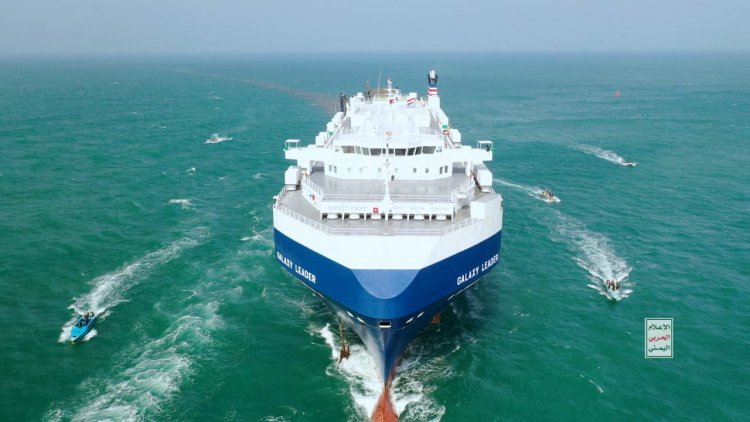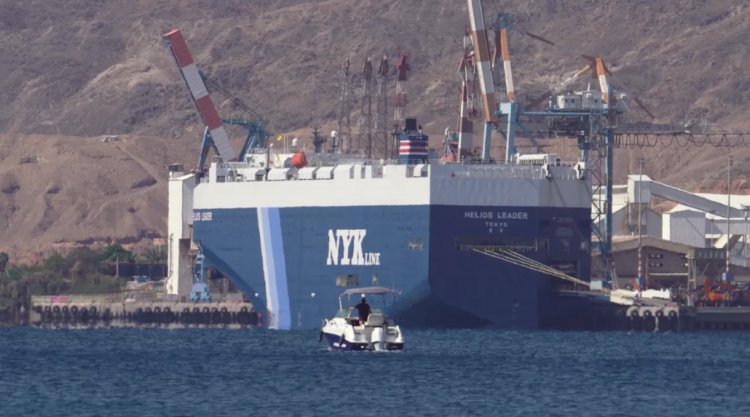The Houthis and cargo ships...a new crisis threatening the global economy
Continued Houthi attacks on ships in the Red Sea may make escalation inevitable

The British magazine “The Economist” warned of the possibility of a maritime crisis that could turn Israel’s war on the Gaza Strip into a global issue with repercussions on the entire world’s economy.
In its report, issued yesterday, Saturday, December 16, 2023, the magazine pointed out that 4 of the 5 largest maritime shipping companies suspended their services in the Red Sea, the route through which shipping traffic must pass from the Suez Canal, due to the escalation of attacks by the Iranian-backed Houthi militia.
Vital corridor
The British magazine explained that Bab al-Mandab is a strait that connects Africa and the Arabian Peninsula, and through which an estimated 12% of the volume of global trade and 30% of global container traffic passes.
However, it has become a prohibited area due to the escalation of the Houthi militias, based in Yemen, to attack ships, under the pretext of supporting the Palestinians in Gaza. On December 15, the Houthis threatened to attack a ship and hit another with a drone, while they fired two ballistic missiles at the MSC Palatium ship, one of which hit the ship.
This attack was the first to use an anti-ship ballistic missile, and on December 16, the American ship “Carney” shot down 14 drones over the Red Sea, while the British ship “Diamond” shot down another drone.
Imminent crisis
According to The Economist, the global shipping industry is heading into emergency mode, as a result of the escalating danger facing cargo ships and their crews.
On December 15, the German “Hapag-Lloyd” and the Danish “Maersk” companies stopped their services. On December 16, they were followed by the French “CMA-CGM” and the Italian-Swiss “MSC”.
MSC, the owner of Palatium, said that its ships will not use the Suez Canal in either direction until it is “safe to cross the Red Sea,” and that other ships will be diverted via the Cape of Good Hope.
The magazine reported that these four companies together represent 53% of global container trade. Now, small container companies, dry bulk carriers and oil tanker companies may follow.
Repercussions of the crisis
This crisis has two main impacts, the first relates to the global economy, and the second relates to the risks of military escalation in the Middle East, at a time when Western countries are trying to re-establish order.
Regarding the economy, The Economist indicated that Suez Canal revenues represent a primary source of income for Egypt, and Israel will be affected to a lesser extent, because only 5% of its trade passes through Eilat, the port overlooking the Red Sea.
For the global economy, a prolonged closure of the Suez Road will raise trade costs because shipping will pass around Africa, taking more time and raising insurance fees. If the threat of a security crisis in the Red Sea extends to the Arabian Sea, through which a third of the world's seaborne oil supply passes, economic costs could rise further.
Houthi threat
The Economist indicated that the Houthi threat is large and complex. The group claims that it is targeting “all ships heading to Israeli ports” so that food and medicine can reach Gaza, but most of the ships under attack are neither destined for nor owned by Israel.
The magazine added that Iran armed the Houthis and trained them well. Some of the weapons used in the attack are also highly advanced. In this regard, Fabian Henze, a researcher at the International Institute for Strategic Studies, said that the Houthis “have a huge arsenal of anti-ship missiles,” some of which have a range of up to 800 kilometers.
It is not yet clear to Western officials whether Iran is directing the individual attacks. Likewise, Israeli intelligence was not convinced that the Quds Force authorized the recent strikes. However, the group is believed to receive shipping intelligence from Iranian surveillance ships in the Red Sea.
Trying to contain the threat
According to the British magazine, the danger now is that Houthi strikes drag in a wider range of countries, and a greater military response to the Houthi threat is now likely.
A multinational task force, led by the US Navy, is now operating off the Yemeni coast to deter the Houthis from boarding ships by force or launching missiles. In recent weeks, American, British and French warships have intercepted Houthi drones and missiles, and America has asked Australia to send a warship.
The Economist pointed out that this defense fleet struggled to keep the crisis under control, suggesting that the next possible step would include armed escort for commercial shipping ships, but this step is resource-intensive and requires a huge number of warships.

What's the alternative?
The main alternative is to strike the Houthis and their arsenal directly, according to “The Economist.” America and Israel have developed plans to attack the Houthis’ depots and bombers, but Washington will be reluctant to expand its participation in the Middle East, so the Joe Biden administration has focused on expanding the Red Sea Task Force and exerting diplomatic and economic pressure on the Houthis. Iran.
The British magazine indicated that Israel does not want a new conflict, as it is already facing pressure from America to end this phase of the Gaza war, and it is also concerned about the Lebanese Hezbollah, which fires rockets at Israel on an almost daily basis.
But if Iran and its Houthi proxies continue to launch attacks that keep one of the world's most important sea routes closed, escalation may become inevitable.


 Shrouq
Shrouq 












